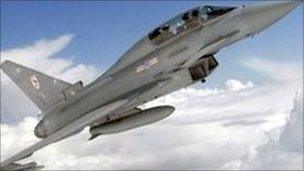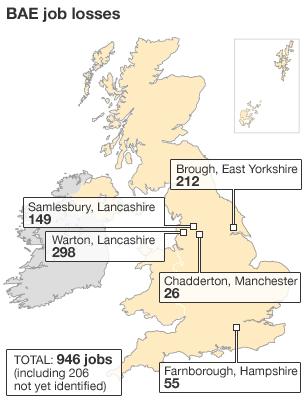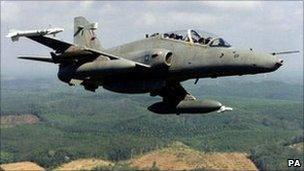Defence firm BAE cuts 1,000 jobs
- Published

Unions said the job cuts signalled "worrying" times for the industry
Defence company BAE Systems has revealed plans to cut almost 1,000 jobs at sites across the UK.
It said the cuts were a result of changes in the defence programme announced in December, together with "other workload changes".
The Confederation of Shipbuilding and Engineering Unions said it meant "worrying prospects" for the industry.
In England, 740 jobs will be axed at sites in Brough, Chadderton, Farnborough, Samlesbury and Warton.
In addition, BAE's Integrated System Technologies (Insyte) confirmed 206 jobs would be cut across its 12 sites in the UK by the end of 2011.
Reduction in workload
A spokeswoman said a further 433 job cuts had already been confirmed for the end of 2010, bringing the total number axed in that division to 639.

Rory Fisher, managing director of BAE's Integrated System Technologies division, said: "These reductions will shape our business appropriately to meet existing and future commitments. We will take all possible actions to mitigate these potential job losses."
The company said there could be 212 job losses at Brough, in East Yorkshire, associated with a reduction in workload, mainly on the Hawk programme, and 26 job losses at Chadderton, Manchester, because of a reduction in workload in the large aircraft business.
A further 55 job losses are expected within the Harrier team at Farnborough, Hampshire, and 149 jobs are set to go at Samlesbury in Lancashire.
In Warton, Lancashire, 298 jobs are set to be cut.
Kevin Taylor, managing director of BAE's Military Air Solutions (MAS) division, said: "We have today initiated consultation regarding potential job losses across the Military Air Solutions business, affecting the Brough, Chadderton, Farnborough, Samlesbury and Warton sites.
"Potential job losses are in manufacturing, engineering and associated support functions.
'Challenging environment'
"These potential job losses result from the impact of the changes in the defence programme announced in December 2009, together with other workload changes.
"It is vital that MAS remains competitive by ensuring we have the correct balance of skills, capabilities and resources as we await the outcome.
"Today's announcement is designed to ensure we remain properly positioned in what will undoubtedly become an increasingly challenging environment."

Job losses at Brough are due to a fall in workload on the Hawk programme
A spokesman from BAE Systems said the "changes in the defence programme" announced last December included a reduction in the number of Harriers in service and the early retirement of the Nimrod MR2.
He said "other workload changes" included the completion of VC10 work packages, retirement of Nimrod R1 in early 2011 and a reduction in work on the Airbus passenger aircraft for Spirit Aerosystems.
The Confederation of Shipbuilding and Engineering Unions warned the outcome of the forthcoming strategic defence and security review and the cuts being demanded by the treasury meant "worrying prospects" for the defence industry.
CSEU general secretary Hugh Scullion said: "The unions are shocked at the scale of these losses and will be demanding an explanation from BAE.
"Talks will begin locally in the first instance to attempt to mitigate the planned losses and if necessary national negotiations will follow. The unions will oppose any compulsory redundancies.
"With the forthcoming defence review these cuts may be the tip of the iceberg, but knee-jerk reactions from employers could make things even worse."